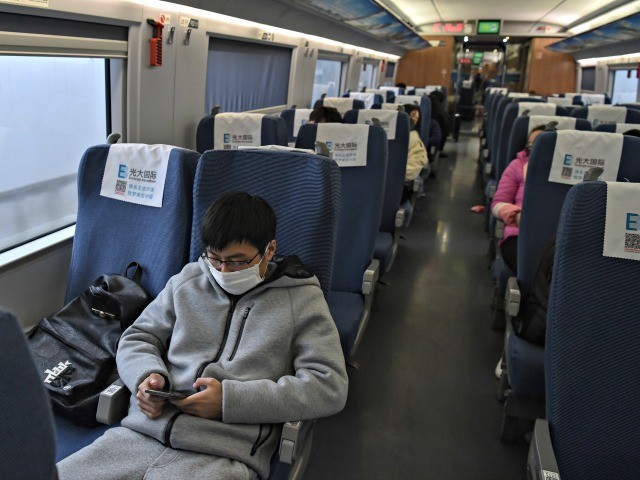Chinese citizens are masking their flu-like symptoms to make it through airport checkpoints set up around the world to screen for the coronavirus, according to several reports on Thursday citing Chinese social media posts.
The symptoms could be a sign that the individuals are carrying a newly identified coronavirus originating in the central Chinese city of Wuhan, which Chinese health officials identified this week and has killed 17 people so far.
The South China Morning Post identified the case of one Wuhan woman who claimed to use medication to lower her temperature when traveling to France, then boasted of evading detection.
“I had a fever and a cough before I left – I was so scared. I quickly took some medicine and checked my temperature,” the woman, later identified as Ms. Wan, posted along with a photo of herself and a friend. “Luckily the temperature was controlled and I had a smooth journey through the border.”
The report about the woman did not say where in France she arrived and where she had subsequently traveled.
The Hong Kong broadcaster RTHK identified other similar posts from Chinese social media users claiming they were able to “escape” Wuhan, a city of 11 million people, before the government froze all public transportation and locked the city down late Wednesday.
Residents scrambled to leave the epicentre of a deadly Sars-like virus outbreak before a virtual lockdown was imposed on the city on Thursday.
Authorities halted flights and trains out of Wuhan from 10am local time. But on social media, people who said they are from Wuhan posted messages saying they left the city before the lockdown was implemented.
“Escape from Wuhan” has become a popular hashtag on Weibo, a microblogging website on the mainland.
“I escaped in the small hours,” one individual wrote. There were so many cars on the highway.”
“We’ve escaped the epidemic zone after taking some fever reducers,” another person wrote. “I’ll visit the doctor in Shanghai if my fever doesn’t go away a week later.”
The latter also said a trip to Disneyland was planned.
The Chinese government has responded by issuing orders to citizens through its embassies, including in France:
Our embassy has received multiple phone calls and emails from Chinese nationals regarding a woman from Wuhan who posted on social media about deliberately taking fever medication in order to evade the airport temperature checks.
We attach high importance to this incident and were able to contact Ms. Yan, who is involved in this incident. We have requested that she call the French emergency hotline [for her case] to be handled by the relevant departments.
The South China Morning Post reported on the reaction in France and beyond:
French authorities meanwhile said they would separate any passengers arriving in the country who had a fever so that they could be assessed by emergency health personnel.
Other Chinese embassies, including in the United States, South Korea and Thailand, have issued similar notices to nationals travelling abroad.
More than 570 people have now been confirmed as infected with the pneumonia-like virus, with 17 deaths since the outbreak began in late December. Outside mainland China, cases of the new coronavirus have also been reported in Macau, Taiwan, the US, Japan, South Korea and Thailand. Chinese experts have confirmed that human-to-human transmission has played a role in the outbreak, and Wuhan is now in lockdown, with all public transport in and out of the city stopped on Thursday morning as authorities try to limit the spread of infection.
The South China Morning Post also reported that the Chinese embassy in Washington said there would be extra quarantine measures for travelers arriving from Wuhan at five U.S. airports – New York, San Francisco, Los Angeles, Atlanta, and Chicago.
The South China Morning Post also noted that the health crisis is happening during one of the country’s busiest travel seasons over the weeklong Lunar New Year. Some 6.3 million Chinese traveled over the holiday last year but the virus could change some people’s plans this year.
Follow Penny Starr on Twitter

COMMENTS
Please let us know if you're having issues with commenting.